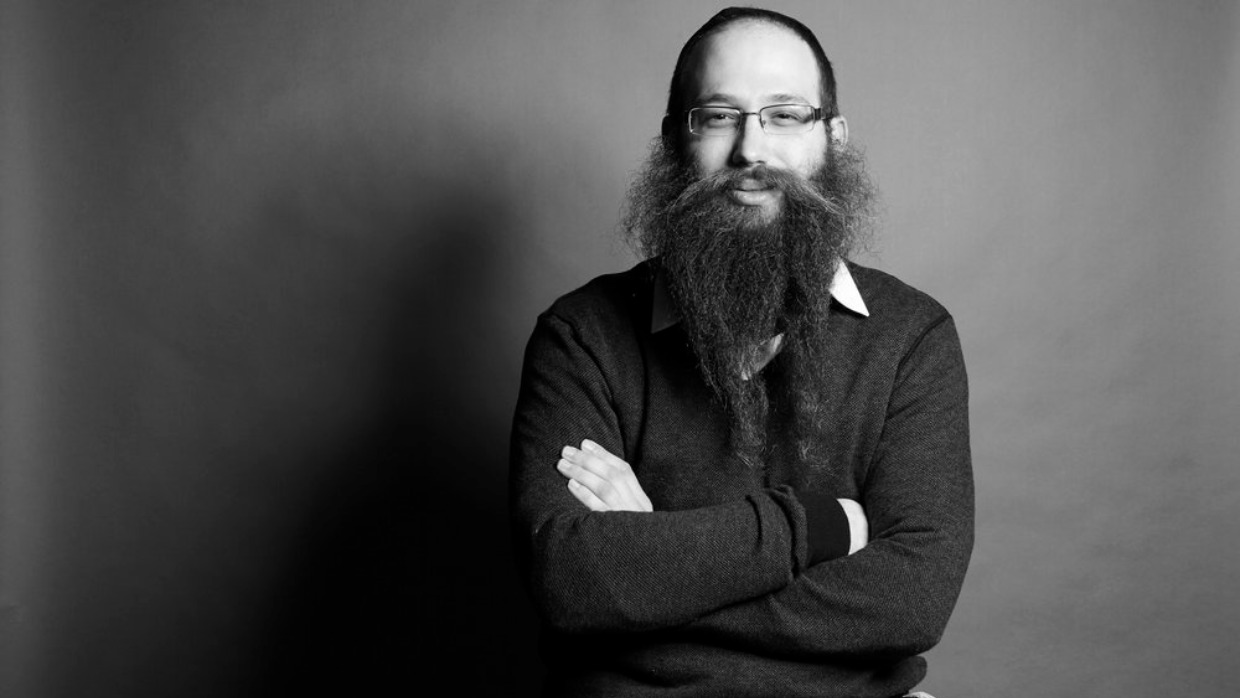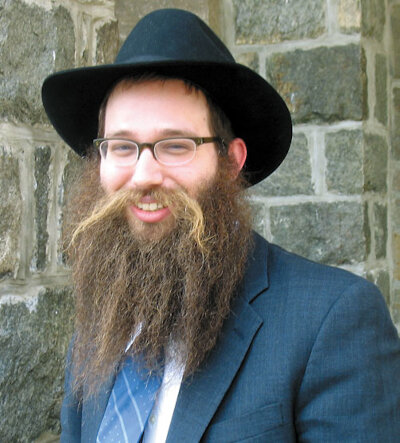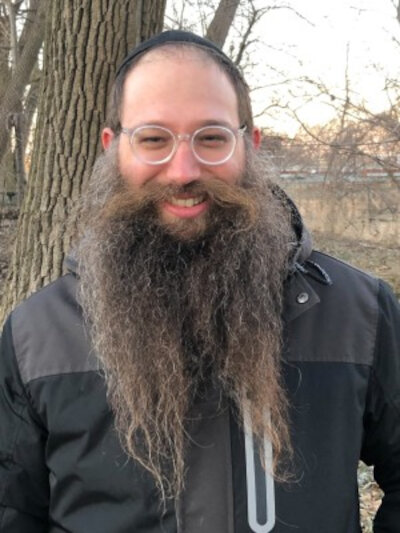 Identifying as a Jew
Identifying as a Jew


12 min read
Yehoshua November is using his craft to bridge the spiritual and the physical.
Growing up in an Orthodox Jewish home in the US, Yehoshua November chose an uncommon path for a Jewish boy. He had been writing poetry from a young age, and by the time he was a senior in high school, he knew that he wanted to be a poet. He studied poetry in college and then pursued a Master’s of Fine Arts in graduate school. Today, Yehoshua teaches writing at Rutgers University and Touro University and is the author of three poetry collections, God’s Optimism (a finalist for the L.A. Times Book Prize), Two Worlds Exist (a finalist for the National Jewish Book Award and Paterson Poetry Prize), and The Concealment of Endless Light (Orison Books, fall 2024).
He is also a visibly Orthodox Jew affiliated with Chabad.
Yehoshua’s poetry is narrative and accessible. In an exclusive interview with Aish.com, he says, “I once had the honor of having a poem in the New York Times Magazine, and Matthew Zapruder, the poet who introduced the piece, described my work as ‘radically clear.’ That’s just what ends up happening. Often, I think, a style or a poem chooses the poet more than the poet chooses what or how they want to write. Writing accessible poetry comes naturally to me, it’s what I gravitate to.”
Though Yehoshua’s poetry is often Jewish-themed, it is appreciated by poetry lovers of various religions and cultures. His poems are “an exploration of what a life of faith looks like in the ordinary world,” he explains. “I try to be honest. I would like to realistically render the ups and downs a life of faith can entail—even as individuals hold onto their faith. I hope that fusing realism and spirituality resonates with readers and strengthens them. I think that religious poets can gain an audience with secular readers, too, if they offer a portrait of Jewish daily life that acknowledges challenges and complexities.
My work tends to explore difficult moments, personal flaws or mistakes that I’ve made, challenges that I’m experiencing. When you share these vulnerabilities, you are less likely to come across as holier than thou.
“Some secular readers may assume that people of faith believe they have all the answers and, therefore, live very simplistic lives. My work tends to explore difficult moments, personal flaws or mistakes that I’ve made, challenges that I’m experiencing. When you share these vulnerabilities with a reader, you are less likely to come across as holier than thou. You’re not speaking down to anybody. You just have this belief that you’re trying to live up to, and you’re struggling with it. So that’s one way a poet of faith’s work can resonate with those who see themselves as secular. And maybe such poetry even makes faith more accessible.”

Yehoshua sees a lot of overlap between contemporary poetry and Jewish thought. “A lot of contemporary poetry attempts to uplift and shine light on ordinary experience,” he says. “Many poets aim to capture something beneath the surface of what we see, uncovering what is wondrous about the everyday.
“Chassidic thought teaches that God created the world because He wants a home in the lowest realm, this earthly existence. Therefore, Jewish ritual life emphasizes the performance of mitzvot (commandments) that are oriented around physical items, like tefillin, keeping kosher, and so forth. Judaism is not an ascetic religion that aims to leave physicality behind; rather, the goal is to fuse the physical and the spiritual. Just take the central concept of the Mishkan [Tabernacle], the temporary home the Children of Israel were instructed to create in the desert. It was made out of physical materials and drew Divine light, or the Shechina, into these physical materials. Great Jewish sages have also suggested that each individual’s ordinary life constitutes a Mishkan where the Divine dwells when we use our physical possessions and everyday encounters for holy purposes.
“Obviously, there are significant differences between Jewish theology and the ethos of contemporary poetry, but both place a surprisingly strong emphasis on illuminating the ordinary and the mundane, suggesting that the arrow shouldn’t be pointed to the Heavens but towards the earth.”
Yehoshua was introduced to creative writing in middle school. His teacher “was passionate about the creative process,” he says. “That was my first introduction to the idea that you can do something creative.”
I think my first exposure to poetry was through singer-songwriters, like Bob Dylan and Simon and Garfinkel.
Yehoshua received a lot of support from his family on his journey towards becoming a poet. His mother studied art history and taught occasionally, though her main occupation was raising her family. His father, an OB/GYN doctor by profession, “was passionate about art, music, and literature,” says Yehoshua. “He would pay me and my siblings $10 for every book we read. My family was interested in the arts, in culture. My father played a lot of music in our home. I think my first exposure to poetry was through singer-songwriters, like Bob Dylan and Simon and Garfinkel.”
Out of four children in the family, three are published poets. “My parents were definitely supportive of us pursuing our own paths,” says Yehoshua. “I was influenced by my older brother, who started writing before I did. When I was a teenager, I felt that writing was the most poignant and effective way to express myself. Many young people feel alienated and misunderstood, and writing was a way to voice that and to share myself with others. A poem can capture so much in a very succinct space. Teenagers want to communicate with others, to connect and not feel alone. I remember thinking I could hand somebody a poem, and they would get a sense of who I was in a very short amount of time.”
In high school, Yehoshua encountered supportive teachers and classmates. He participated in poetry workshops and wrote a lot of poetry. In college, he says, “I met many supportive professors who encouraged me. And then I took myself more seriously as a writer and entertained the possibility that I could actually find an audience as a poet.”
In college, Yehoshua also met his wife. “I proposed with a poem,” he says. He got married shortly after graduation, and many of his professors attended the wedding.
The young couple moved to Pittsburgh, where Yehoshua’s family lived. He went to graduate school to study poetry while his wife studied social work.
Yehoshua found himself at odds with one of his highly regarded professors, who challenged him to write a poem condemning the State of Israel.
While in graduate school, Yehoshua encountered and was enthralled by the world of Chassidic thought. Newly married and living a traditional Jewish life, Yehoshua did not feel quite at home in the literary scene. He also found himself at odds with one of his highly regarded professors, who challenged him to write a poem condemning the State of Israel. “I got kind of turned off with literary life at a certain point and decided that I didn’t want to be in the academic world anymore. I didn’t care anymore if I wrote poetry. At a certain turning point, I decided that when I finished graduate school, I wanted to go to yeshiva.”
After graduate school, Yehoshua studied Jewish texts in a Chabad yeshiva. “I probably didn’t read a book in English for two years,” he says. “And I didn’t think that I wanted to go back to secular academics.”

He considered becoming a rabbi or Judaic studies teacher. His wife was expecting their second child, as he weighed how he wanted to make a living. “Surprisingly, I thought that maybe I should go back to poetry and teach in a university.”
Though some of Yehoshua’s teachers advised him to become a rabbi, other rabbis and mentors told him, “If you have a gift, you are obligated to use it!” He says, “I think this advice was really consistent with the overall theology of elevating and sanctifying what’s otherwise secular and mundane.”
Chassidic teachings inform much of Yehoshua’s poetry. He says, “A lot of it is taking a Chassidic idea and juxtaposing it with everyday life. How does this play out in the messy world, in the messy human experience?”
Poetry is kind of like the practice of trying to sense or feel God’s presence in the ordinary.
He also sees writing poetry as part of building a relationship with God. “Poetry is kind of like the practice of trying to sense or feel God’s presence in the ordinary. It’s part of noticing and appreciating Divine Providence.”
This year Yehoshua is publishing his third poetry collection. All of his books have been published with secular publishers. He says, “There is a famous counterintuitive writing axiom which states ‘the universal is in the particular.’ This means that when you write about your specific experiences, your work will resonate with many readers or have a more universal impact.
“If you write about your life and all of its cultural details, with a lot of specificity, your writing has a better chance of moving others, of seeming authentic, even if your readers’ lives are quite different from your own. If you’re preaching, or speaking down to the reader, or have an overt agenda, then your work will almost always fall flat. But if you’re honest with yourself and willing to be vulnerable in some of your work, your poetry might ring true. Obviously, there has to be craft and skill too, but I think people can sense authenticity, if you can get to that place.”
Yehoshua finds that some secular readers are surprised by his poetry. “Just my appearance is surprising to them,” he says. “But I’ve been supported by the people I work with and by my students. I do think that it’s harder to publish work with strong religious themes in mainstream secular venues, but I’ve been fortunate to publish in pretty secular places.”
When it comes to Jews or the State of Israel, Yehoshua has noticed a double standard in the academic world, but he has not encountered antisemitism on a personal level.
When it comes to Jews or the State of Israel, Yehoshua has noticed a double standard in the academic world, but he has not encountered antisemitism on a personal level. “I don’t bring the conflict in the Middle East up in my classes,” he says. “I just want to focus on students’ writing.”
Yehoshua’s main advice for aspiring poets is: read poetry.
He adds, “I would advise to read other things as well, to have something to write about beyond your own personal experience. When I was in graduate school, I studied under Tony Hoagland, a famous American poet who passed away a few years ago. He actually told me, ‘You are very lucky because you have a deep well to draw upon in the Jewish tradition. Your peers are more adrift because they are not necessarily anchored to a tradition.’”
Another important piece of advice is “not to put pressure on yourself to write something great.” Such pressure can close the door to creativity. It leads to overthinking, which, in turn, leads to using a more constricted part of the brain rather than the creative channels. Yehoshua advises not to try too hard on the first draft. He also recommends finding a prompt. In his teaching experience, prompts often lead to original and inventive writing.
“Poetry has a bad rap. If you ask an average person on the street if they like poetry, they will say no. Why? Because they think they don’t understand it. They see poetry as a complex riddle. But poetry doesn’t have to be like a riddle you decode. It can be accessible. Poetry can serve as a poignant vehicle for a person to communicate their story in a compressed and powerful way.
“When people read contemporary poetry, they bring a lot of assumptions to the table, but they are often pleasantly surprised by how accessible the genre can be. Take a look at contemporary narrative poetry. Your opinion of what poetry is will probably change.”
2AM, AND THE RABBINICAL STUDENTS STAND IN THEIR BATHROBES
2AM, and the rabbinical students stand in their bathrobes
at the edge of the yeshiva parking lot, watching
the practiced motions of muscular firemen disembarking
from their engine. Soon, it will be determined
the youngest student in the building
pulled the basement alarm
after learning, over the dormitory pay phone,
his parents, back in Baltimore, intend to end
their nineteen year marriage before Passover.
The only one the rabbis have not accounted for
crouches in his closet behind a row of black sports coats.
And because the yeshiva caters to souls
but also bodies,
the early morning mysticism class
on why the Divine Presence cannot dwell
amongst those plagued by sadness
has been cancelled.(published in Two Worlds Exist, Orison Books. Copyright © 2016 by Yehoshua November)
Baal Teshuvas at the Mikvah
Sometimes you see them
in the dressing area
of the ritual bath,
young bearded men unbuttoning
their white shirts,
slipping out of their black trousers,
until, standing entirely naked,
they are betrayed by the tattoos
of their past life:
a ring of fire climbing up a leg,
an eagle whose feathery wing span
spreads the width of the chest,
or worse, the scripted name of a woman
other than one’s wife.Then, holding only a towel,
they begin, once more, the walk
past the others in the dressing room:
the rabbi they will soon sit before
in Talmud class,
men with the last names
of the first Chasidic families,
almost everyone,
devout since birth.And with each step,
they curse the poverty
that keeps the dark ink
etched in their skin,until, finally, they descend the stairs
of the purifying water
and, beneath the translucent liquid,
appear once again
like the next man,who, in all his days,
has probably never made a sacrifice
as endearing to God.
(published in God’s Optimism)
Featured Image above: by Marko Dashev

Awesome poetry!
You sang my heart with your words! I've been writing grass roots, words on subway walls type poetry since I was three. If one is born a poet, the words jump off the page, into our dance, our evolution as spiritual and physical beings, how we practic our professions, bake hamantashen, pray!, It is that simple, that complex!
Yes, Simon and Garfunkel, Bob Dylan, Leonard Cohen! .
Such beauty in these poems on many levels. The Baal Tshuvas at the Mikva brought tears to my eyes, as I know several with tattoos who bemoan their previous religious observance. Although I have no tattoos, my husband I felt similarly on our journey. The last line of redemption reminds me of what we left behind and what we gained. Kol Hakavod!
Excellent article on poet, November.
Just beautiful. Lucid, succinct. Makes you think